PMI-ACP : PMI Agile Certified Practitioner : Part 19
-
Which Agile method goes through the following stages:
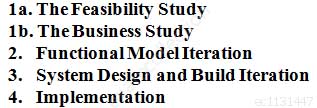
PMI-ACP PMI Agile Certified Practitioner Part 19 Q01 023 - Rational Unified Process (RUP)
- Feature Driven Development (FDD)
- Dynamic Systems Development Method (DSDM)
- Lean Software Development
- Scrum
-
What is a Japanese term used in Lean software development is an activity that is wasteful, unproductive, and doesn’t add value?
- Sashimi
- Kanban
- Muda
- Kairoshi
-
Which one is not a value of Lean Development?
- Pursue perfection
- Ensure collective code ownership
- After a project flows, keep improving it
- Balance long-term improvement and short-term improvement
-
DRAG DROP
Pick 5 activities that are the responsibilities of the development team in Scrum.
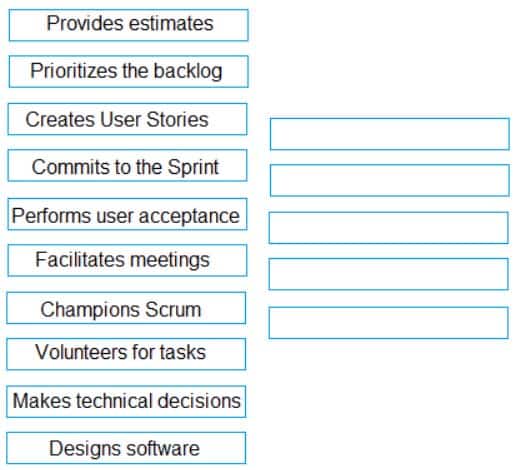
PMI-ACP PMI Agile Certified Practitioner Part 19 Q04 024 Question 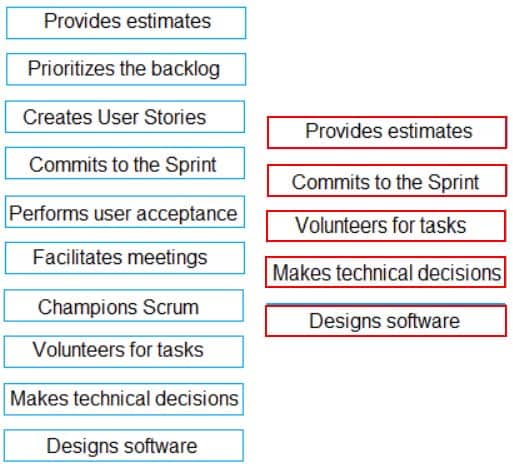
PMI-ACP PMI Agile Certified Practitioner Part 19 Q04 024 Answer Explanation:
Provides estimates
Commits to the Sprint
Volunteers for tasks
Makes technical decisions
Designs software -
DRAG DROP
Pick which 4 activities are the responsibilities of the Product Owner in Scrum.
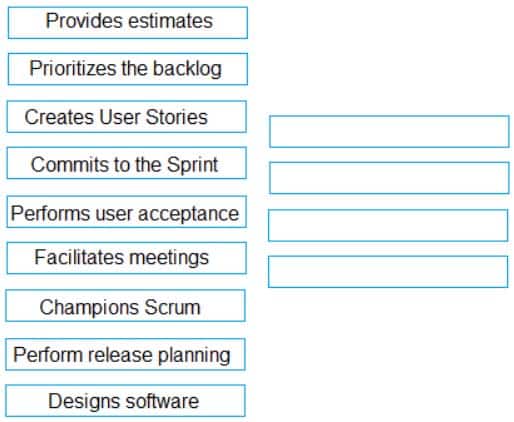
PMI-ACP PMI Agile Certified Practitioner Part 19 Q05 025 Question 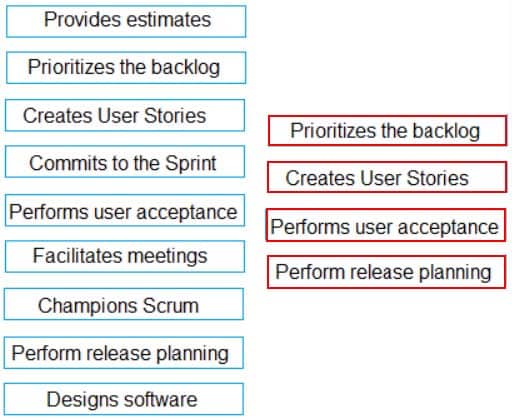
PMI-ACP PMI Agile Certified Practitioner Part 19 Q05 025 Answer Explanation:
Prioritizes the backlog
Create User Stories
Performs user acceptance
Perform release planning -
DRAG DROP
Pick which 3 activities are the responsibilities of the Scrum Master in Scrum.
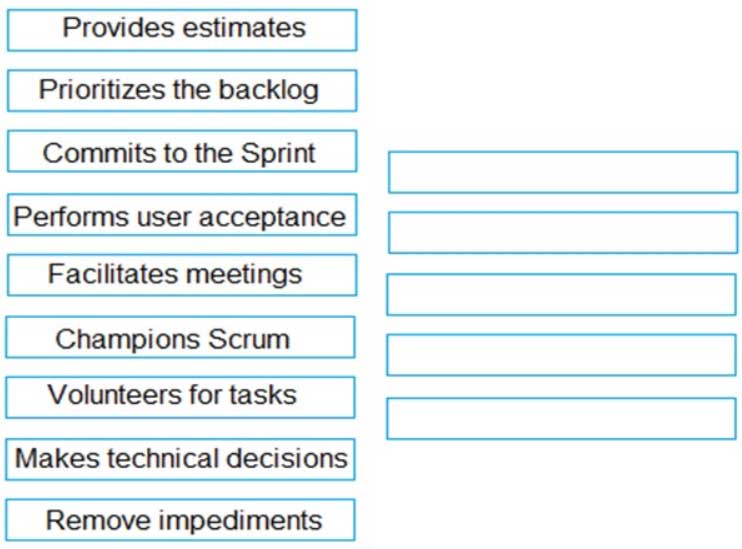
PMI-ACP PMI Agile Certified Practitioner Part 19 Q06 026 Question 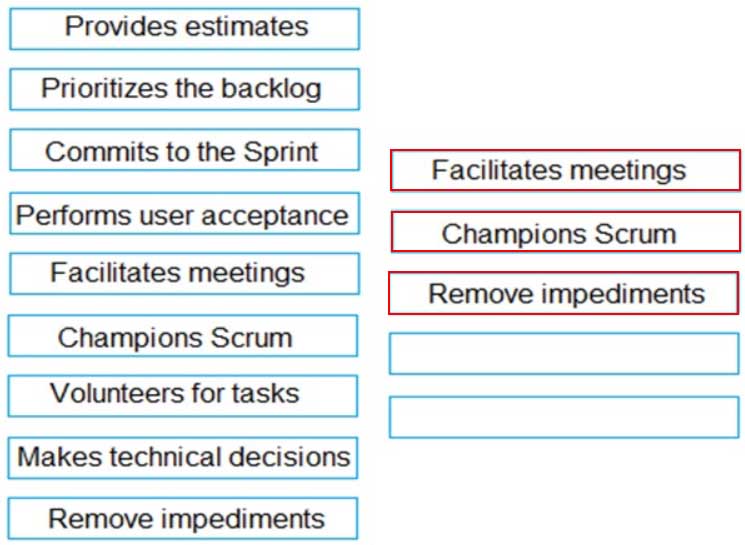
PMI-ACP PMI Agile Certified Practitioner Part 19 Q06 026 Answer Explanation:
Facilitates meetings
Champions Scrum
Remove impediments -
What of the following is not a step in the Value Stream Mapping process?
- Define the current state
- Collect data
- Amplify Learning
- Depict the future state
- Develop an implementation plan
-
At completion of iteration planning, the team has finished identifying the tasks they will commit to for the next iteration. Which of the following tools best provides transparency into the progress throughout the iteration?
- Burndown chart
- Gantt chart
- Hours expended chart
- Management baseline chart
-
A common reason a story may not be estimable is the:
- team lacks domain knowledge.
- the story did not include a role
- developers do not understand the tasks related to the story.
- team has no experience in estimating.
-
The purpose of a Sprint retrospective is for the Scrum team to:
- Review stories planned for the next sprint and provide estimates,
- Demonstrate completed user stories to the Product Owner.
- Determine what to stop doing, start doing, and continue doing.
- Individually provide status updates on user stories in progress.
-
Question: Which of the following BEST describes ROTI?
- Measure of product backlog items (PBI) remaining
- Measure of quality of features delivered in an iteration
- Measure or required effort to complete an iteration
- Measure of the effectiveness of the retrospective meeting
-
What Agile concept expresses delivering value in slices rather than in layers/stages?
- Definition of Done
- Value Mapping
- Sashimi
- Lean Value
-
In the Kano Model of customer satisfaction, this type of feature makes a product unique from its competitors and contributes 100% to positive customer satisfaction:
- Excitement
- Performance
- Must-have
- Threshold
-
Which of the following is NOT a principle from the Agile Manifesto?
- Our highest priority is to satisfy the customer through early and continuous delivery of valuable software.
- Business people and developers must work together daily throughout the project.
- Continuous creation of technical debt and good design enhances agility.
- Working software is the primary measure of progress.
-
Which chart shows the total number of story points completed through the end of each iteration?
- Iteration Burndown chart
- Cumulative story point Burndown chart
- Daily Burndown chart
- Burnup chart
-
DRAG DROP
What is the order the hierarchy of product definition?
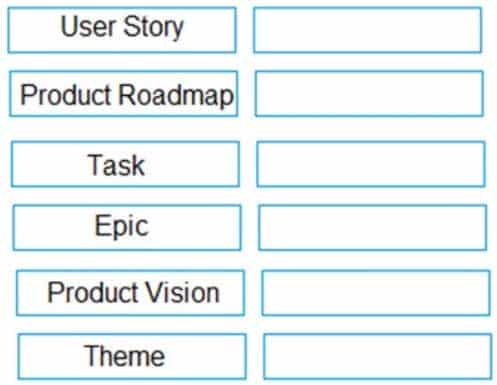
PMI-ACP PMI Agile Certified Practitioner Part 19 Q16 027 Question 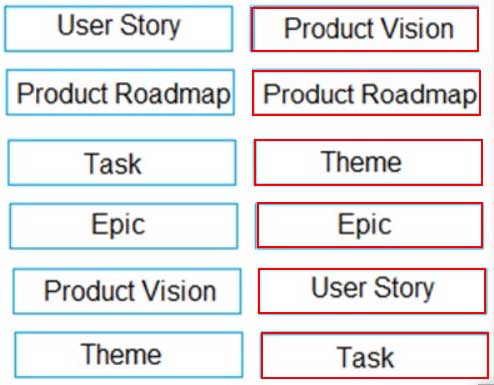
PMI-ACP PMI Agile Certified Practitioner Part 19 Q16 027 Answer Explanation:
Top to bottom as written
Product Vision
Product Roadmap
Theme
Epic
User Story
Task -
What Agile planning artifact is updated minimally once a year by the Product Owner?
- Product Vision
- Product Roadmap
- Release Plan
- Sprint Plan
- Daily Plan
-
What Agile planning artifact should be updated at minimum semi-annually?
- Product Vision
- Product Roadmap
- Release Plan
- Sprint Plan
- Daily Plan
-
What Agile planning artifact is created by the Product Owner and the development team?
- Product Vision
- Product Roadmap
- Release Plan
- Sprint Plan
- Daily Plan
-
DSDM uses MoSCoW technique to create the prioritized requirements list. In MoSCoW technique, ‘M’ stands for:
- Most useful
- Must have
- Must not have
- Minimum marketable feature
Subscribe
0 Comments
Newest